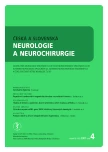Surgical treatment of hormonally active hypophysial adenomas
Authors:
V. Masopust 1; D. Netuka 1; V. Hána 2; J. Marek 2; V. Beneš 1
Authors‘ workplace:
Neurochirurgická klinika 1. LF UK, IPVZ a ÚVN Střešovice, Praha
1; 3. interní klinika 1. LF UK a VFN, Praha
2
Published in:
Cesk Slov Neurol N 2007; 70/103(4): 402-406
Category:
Short Communication
Podpořeno grantem IGA MZ ČR NR 8052-3
Overview
There had been treated 277 patients with pituitary adenoma in period from 1999 to 2003 at Department of Neurosurgery, Central Military Hospital, Prague. Altogether there had been treated 108 patients with hormone-secreting adenomas. Normalization or sufficient hormone level decrease was observed in 61 patients after the first surgery. Hormone level decrease was not sufficient in remaining cases. Second surgery was performed in 18 cases, medicamental treatment was indicated in 17 cases, radiosurgery was applied in 34 cases. There was no mortality after transsphenoidal surgery, morbidity was observed in 2 cases (visual impairment in 1 case, CSF leak in 1 case). Permanent adiuretine substitution is needed in 7 cases.
Key words:
pituitary adenoma – hormone-secreting – trassphenoidal surgery
Sources
1. Rosegay H. Cushing’s legacy to transsphenoidal surgery. J Neurosurg 1981; 54: 448-454.
2. Walker EA. A History of Neurological Surgery. Baltimore: Williams a Wilkins 1982.
3. Hardy J. Transsphenoidal hypophysectomy: neurosurgical techniques. J Neurosurg 1971; 34: 582-584.
4. Fusek I, Černý E. Transsphenoidal operation of hypophyseal tumors. J Neurosur Sci 1977; 21: 159-160.
5. Fusek I, Černý E. Naše zkušenosti s indikacemi transsfenoidálních operací nádorů tureckého sedla. Česk Slov Neurol N 1978; 41/74: 107-114.
6. Fusek I. Chirurgické léčení nádorů tureckého sedla transsfenoidálním přístupem. Praha: Avicenum 1986.
7. Náhlovský J, Česák T, Látr I, Čáp J, Žižka J, Krajina A. Komplikace transsfenoidálních operací u našich nemocných – příčiny a řešení. Česk Slov Neurol N 2004; 67/100: 112–119.
8. Nomikos P, Buchfelder M, Fahlbusch R. Current management of prolactinomas. J Neurooncol 2001; 54(2): 139-150.
9. Kristof RA, Schramm J, Redel L, Neuloh G, Wichers M, Klingmuller D. Endocrinological outcome following first time transsphenoidal surgery for GH-, ACTH-, and PRL-secreting pituitary adenomas. Acta Neurochir 2002; 144(6): 555-561.
10. Nomikos P, Buchfelder M, Fahlbusch R. The outcome of surgery in 668 patients with acromegaly using current criteria of biochemical 'cure'. Eur J Endocrinol 2005; 152(3): 379-387.
11. Erturk E, Tuncel E, Kiyici S, Ersoy C, Duran C, Imamoglu S. Outcome of surgery for acromegaly performed by different surgeons: importance of surgical experience. Pituitary 2005; 8(2): 93-7.
12. Chen JC, Amar AP, Choi S, Singer P, Couldwell WT, Weiss MH. Transsphenoidal microsurgical treatment of Cushing disease: postoperative assessment of surgical efficacy by application of an overnight low-dose dexamethasone suppression test. J Neurosurg 2003; 98(5): 967-973.
13. Hofmann BM, Fahlbusch R. Treatment of Cushing's disease: a retrospective clinical study of the latest 100 cases. Front Horm Res 2006; 34: 158-184.
14. Bláha M, Netuka D, Mohapl M, Masopust V, Plas J, Beneš V. Operační přístupy do sfenoidální dutiny při mikrochirurgických operacích nádorů hypofýzy. Rozhl Chir 2003; 82/9: 452-455.
15. Cappabianca P, Cavallo LM, de Divitiis E. Endoscopic endonasal transsphenoidal surgery. Neurosurgery 2004; 55(4): 933-940.
16. Jane JA Jr, Han J, Prevedello DM, Jagannathan J, Dumont AS, Laws ER Jr.
Perspectives on endoscopic transsphenoidal surgery. Neurosurg Focus 2005; 19(6): E2.
17. Har-El G. Endoscopic transnasal transsphenoidal pituitary surgery--comparison with the traditional sublabial transseptal approach. Otolaryngol Clin North Am 2005; 38(4): 723-735.
18. Kabil MS, Eby JB, Shahinian HK. Fully endoscopic endonasal vs. transseptal transsphenoidal pituitary surgery. Minim Invasive Neurosurg 2005; 48(6): 348-354.
19. Netea-Maier RT, van Lindert EJ, den Heijer M, van der Eerden A, Pieters GF, Sweep CG et al. Transsphenoidal pituitary surgery via the endoscopic technique: results in 35 consecutive patients with Cushing's disease. Eur J Endocrinol 2006; 154(5): 675-684.
20. Rudnik A, Zawadzki T, Galuszka-Ignasiak B, Bazowski P, Duda I, Wojtacha M et al. Endoscopic transsphenoidal treatment in recurrent and residual pituitary adenomas - first experience. Minim Invasive Neurosurg 2006; 49(1): 10-14.
21. Schwartz TH, Stieg PE, Anand VK. Endoscopic transsphenoidal pituitary surgery with intraoperative magnetic resonance imaging. Neurosurgery 2006; 58(1Suppl): ONS44-51.
22. Fahlbusch R, Keller B, Ganslandt O, Kreutzer J, Nimsky C. Transsphenoidal surgery in acromegaly investigated by intraoperative high-field magnetic resonance imaging. Eur J Endocrinol 2005; 153(2): 239-248.
Labels
Paediatric neurology Neurosurgery NeurologyArticle was published in
Czech and Slovak Neurology and Neurosurgery

2007 Issue 4
Most read in this issue
- Cervical dystonia
- Levels of D-dimers in patients with acute ischaemic stroke
- Thrombosis of the sigmoid sinus – current views on diagnosing and treatment
- Repetitive transcranial magnetic stimulation and chronic subjective tinnitus
